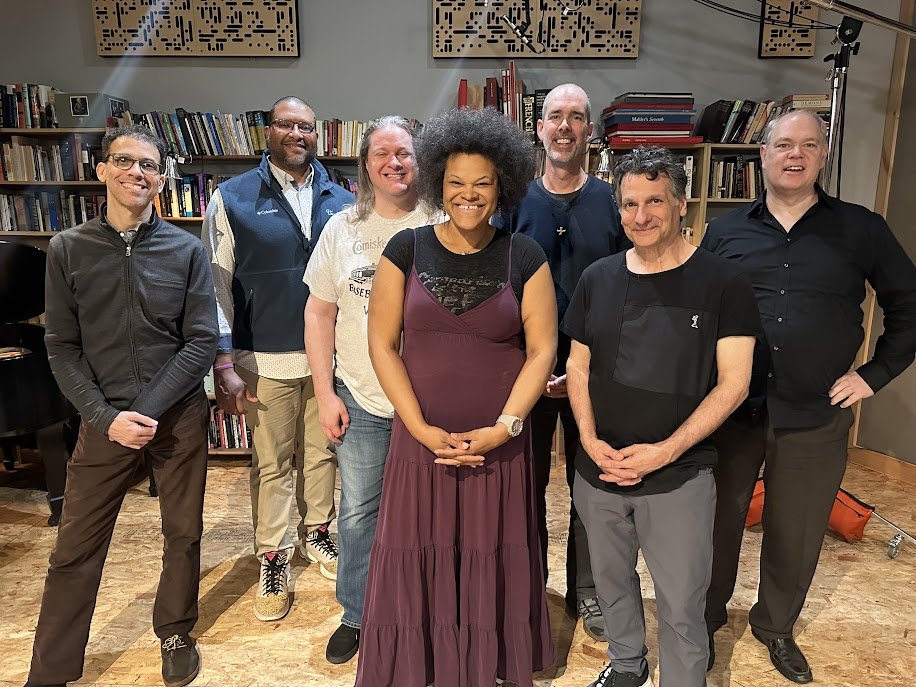
Connexion - a Jazz Psalter
Listen to tracks from the album
Growing up in the Evangelical, Free-church tradition, I didn’t sing the Psalms regularly in worship. We would occasionally read portions of them on a Sunday morning or inadvertently sing a paraphrased version in a hymn by Isaac Watts or the Wesleys. As I journeyed with the Lord, I would encounter the Psalms as a part of my yearly bible reading plan and I began to look for ways to include them more and more in my personal times of worship as well as integrating them into worship planning for the church.
Connexion - a Jazz Psalter had its origins as an evening festival of Psalms service on October 23, 2021. I had used the pandemic lockdown year of 2020 to write many new Psalm settings. My friends Nikki and David Lerner (voice and drums), and Greg Tardy (saxophone and clarinet) joined students and faculty from the Grace College Worship Arts program, where I am a professor, to lead a beautiful vespers offering of music. The evening began with songs of preparation - Psalm 1 and Phos Hilaron (O Gladsome Light - an ancient Christian hymn text from the early 4th century used by the church to start evening prayer). The first section of sung prayer centered around the theme of creation, consisting of Psalms 8 & 96. The next section, the fall, was accompanied by Psalms 142, 90, and 13. The third section, redemption, was lead by Psalms 4, 23, and 34. The last section, restoration, employed Psalms 63, 126, and 103. I wanted to experiment with a larger ensemble while still retaining elements of jazz harmony and improvisation, so I wrote the music for piano, bass, drums, saxophone, trumpet, 3 french horns, and string quartet.
Fast forward to 2023…I was given the gift of a sabbatical from my teaching duties at Grace College and Seminary to focus on some research related to liturgy and hermeneutics, and to record the Psalms from the vespers service of 2021. I contacted one of my musical heroes, John Patitucci, who had come to Grace College the Fall of 2019 for a collaborative concert with my students. He graciously agreed to play bass and give direction on musicians and studio space. I flew to New York and recorded at Oktaven Studios in Yonkers on April 19 & 20, 2023, with myself on piano, Nikki Lerner on vocals, John Patitucci on bass, Adam Cruz on drums, David Lerner on drums, Alex Norris on trumpet, Jimmy Green on sax, and Ryan Streber engineering. I used many of the Psalms from the 2021 vespers service consisting of a variety of Psalm texts from Calvin’s Genevan Psalter, to settings by Isaac Watts. Later in the Summer of 2023, I added a string quartet with my wonderfully gifted wife, Shana and friends, along with several pieces with french horn, and my dear friend and brother Greg Tardy on clarinet.
I had a few goals in mind when composing this project. First, I wanted the Psalm settings to be accessible for the people of God in public worship. The melodies themselves are singable and could be taught to a congregation. The second goal was a variety of presentations. A few of the Psalm melodies I wrote are more strophic (or hymn-like) in nature. Other of the Psalm settings have verses that are sung by the song leader and then the congregation joins in on a simpler chorus or antiphon. The third goal was that I wanted the Psalms to stand alone as something beautiful to listen to. The album is alive with jazz harmonies and rhythms, and orchestrations with strings and horns. I believe it is a pleasure to listen to and would enhance one's personal devotional time.
My prayer is that this album of Psalms set to original music will meet you on your journey with Jesus Christ. I am deeply grateful to Grace College and Seminary, where I have the pleasure to lead the worship arts program as professor, for giving me the gift of a sabbatical and the opportunity to steward the passions God has given me for worship. My prayer is that you will encounter the living Christ as you spend time with him in worship through the Psalms.
Connexion - a Jazz Psalter, origin and meaning:
Much of culture feeds a sense of disconnectedness. Even though technology promises paths to unite, many people feel progressively detached and alone.
The ultimate detachment is a result of sin which leaves us separated from God. This broken connection with our creator vertically, short circuits all other relationships horizontally and also leaves us in an uncoordinated state with our own emotions.
The Psalms, originally sung prayers, were given by God to nurture a connection with him, ourselves, and others. Engaging with these psalms connects our hearts and minds to the truth about our relationship with God and everything around us.
The spelling of Connexion with the letter x is reminiscent of the early church’s abbreviation of the Greek word, Χριστός, which means Christ - the Anointed One, the Messiah. The ending of the word - xion also reminds us of Zion in Scripture, the presence of God, his holy mountain, and a city of refuge (Jerusalem in the OT and the New Jerusalem described in Rev. 21).
The church historically prayed through the Psalter each week (this may have been left over from the monastic tradition). Patrick Henry Reardon in the introduction to his devotional commentary on the Psalms notes,
From the very beginning of her history, when the Church of God turns to him in love and devotion, the words of the Psalter form the expressions that spontaneously, as by an impulse of her nature, rise from her heart and take shape in her mouth. The psalms find their truest context in the heart and on the lips of the Church. Those whose lips constantly move with the syllables of the Psalter give living expression to the deepest being of the Church. (Reardon Patrick Henry. 2011. Christ in the Psalms Revised ed. Chesterton Indiana: Ancient Faith Publishing, vii.)
Two times in the NT (Col. 3:16 and Eph. 5:19) we are instructed by the Apostle Paul to sing psalms, hymns, and spiritual songs. Apart from the obvious application that the church’s worship should include a diversity of sung prayers, we as the Body of Christ should be regularly singing the psalms in our weekly worship gatherings. The Psalms is the most quoted book of the OT in the NT. The fact that God included a Psalter, a holy song book, as a part of his Divine Word should compel us to sing his prayers regularly. The sad reality is that many modern Evangelical churches don’t make a practice of engaging with the Psalms and hardly read much scripture in the worship service at all.
One reason we may be seeing a rise in mental health issues among the younger generations is the decline of letting God speak through his Word generally, and the Psalms in particular when we gather for worship. John Calvin, in the introduction to his commentary on the Psalms says,
I have been accustomed to call this book, I think not inappropriately, “An Anatomy of all the Parts of the Soul;” for there is not an emotion of which any one can be conscious that is not here represented as in a mirror. Or rather, the Holy Spirit has here drawn to the life all the griefs, sorrows, fears, doubts, hopes, cares, perplexities, in short, all the distracting emotions with which the minds of men are wont to be agitated. The other parts of Scripture contain the commandments which God enjoined his servants to announce to us. But here the prophets themselves, seeing they are exhibited to us as speaking to God, and laying open all their inmost thoughts and affections, call, or rather draw, each of us to the examination of himself in particulars in order that none of the many infirmities to which we are subject, and of the many vices with which we abound, may remain concealed. (Calvin Jean and James Anderson. 1949. Commentary on the Book of Psalms. Grand Rapids Mich: W.B. Eerdmans Pub.)
I want to encourage you as you listen to this album to engage in a practice I am calling, auditus divina (sacred listening). You may be familiar with the ancient practice of lectio divina (divine reading) or visio divina (sacred seeing), in which one meditates on the words of scripture or an image for the purpose of worship. Auditus divina is something I practice when listening to music. It is a way of listening deeply and allowing the words and/or music to penetrate your heart and mind as you slow down to enjoy God’s good gifts through the sounds he allows you to hear. As a musician, sometimes I will focus on a particular aspect of the music - the way in which the drummer’s wooden stick is connecting with the metal ride cymbal to produce such a beautifully organic sound. Or how I can almost feel the texture of the acoustic bass through the speakers, as I hear the deep tones of its pizzicato performance. I allow myself to be captivated with the rhythms, textures, harmonies, and melodies, that when combined with the text, engage both my mind and heart (and most likely my body as I breathe and move to the rhythms). Ultimately, auditus divina is meant for you to engage in worship with the God that gave you ears for hearing a wide spectrum of frequencies, a mind to comprehend truth and beauty, and music as varied as the cultures he created.
Regarding the music; why pair the Psalms with jazz? Admittedly, jazz means many things to many people. As a style, it has evolved over time and covers many sub-genres (e.g. early ragtime, big band swing, virtuosic bebop, cool jazz, fusion etc.). I have been attracted to the genre because of its deep harmonic and rhythmic characteristics, as well as the conversation-like quality of improvisation. The Psalms cover an expanse of emotional ground and I believe jazz has the depth musically to match the prosody of this divine poetry. Hebrew poetry is less interested in external forms and employs a freer idea of “thought rhymes.” For example, Psalm 103:10 says, “He does not deal with us according to our sins, nor repay us according to our iniquities.” These two phrases complement each other - variations on a theme, if you will. The two phrases taken together give a much richer, more colorful description of our sin and God’s forgiveness. In the same way, jazz is able to bring a rich palette of harmonic and rhythmic textures to support the text in ways not commonly found in modern worship music. My hope is these expressions of the Psalms will allow you to encounter the Living Christ as you practice the art of sacred listening.
Whether you are new to the bible, the book of Psalms, or are accustomed to reading through the Scriptures regularly, I invite you to let this fresh musical expression of these selected psalms minister to your soul - refashioning connections with God, with yourself, and with others.
Wally Brath
Sunday, September 10, 2023
Warsaw, Indiana.
Psalms for seasons of the soul
John Calvin said the Psalms are an anatomy of the soul. Every human emotion is expressed in the Psalter. God invites us to bring our joys, fears, pain…our whole being to him in worship.
